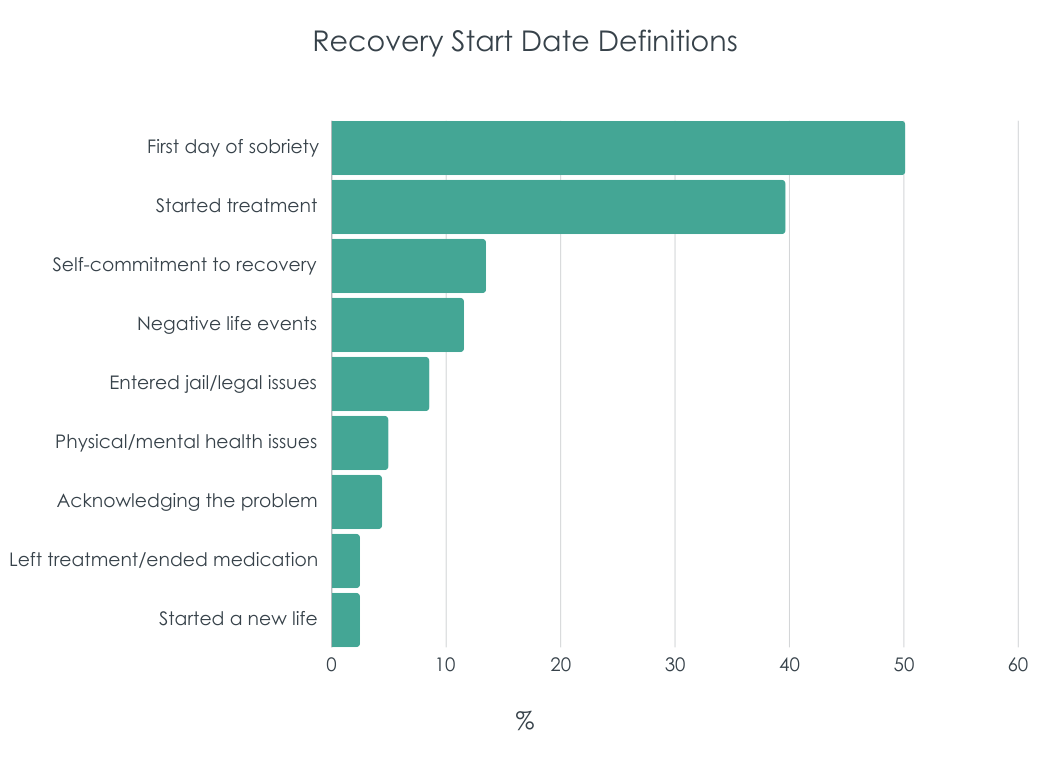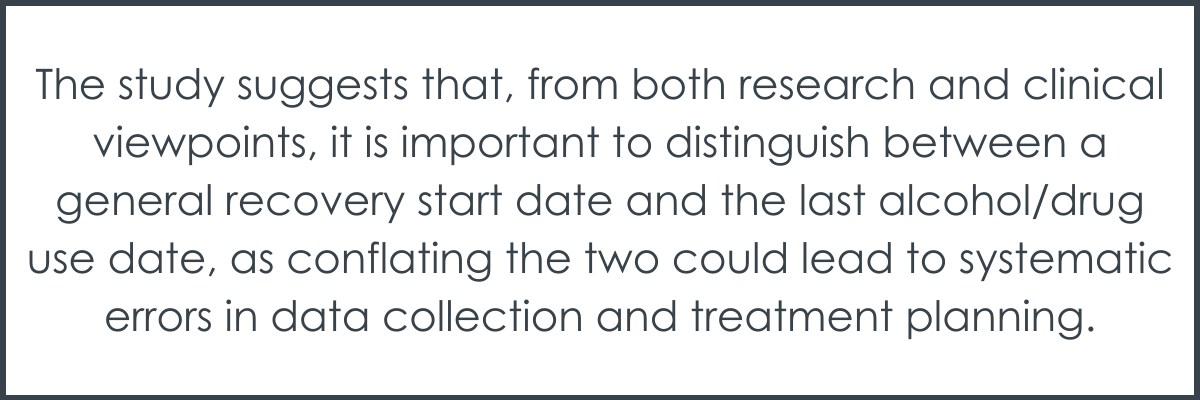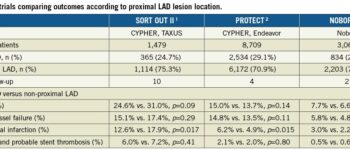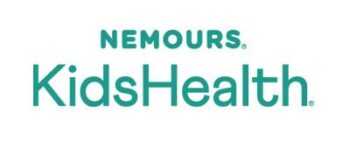
WHAT PROBLEM DOES THIS STUDY ADDRESS?
How one defines the process of recovery may vary among individuals, communities, and professionals. While some view recovery as a state of total abstinence, others see it as a broader process of continuous self-improvement and well-being.
To understand the varied perspectives on this critical milestone, researchers examined how people who identify as being in recovery from substance and/or alcohol use disorder choose to mark the beginning of their recovery. They considered various factors that might influence this choice, such as age, involvement in 12-step groups, and experiences of recurrence of substance use (sometimes referred to as “relapse”).
The aim was to capture the complex interplay between personal beliefs and recovery practices, and to recognize the significance of the date of last substance use (“sobriety dates”) as turning points in the recovery process. This investigation may help to both address the diversity of recovery narratives while also validating the lived experiences of those in recovery. By shedding light on how different factors contribute to defining a recovery start date, it is possible that it may provide a more nuanced look at the process beyond substance use and offer a foundation for more personalized support in the path to recovery.
HOW WAS THIS STUDY CONDUCTED?
The study used a mixed-methods approach, meaning it combined numerical survey data with analysis of personal narratives, to examine how individuals recruited from the community and 2 treatment programs that self-identify as in recovery from substance use disorder define their recovery start dates. Minimal information is provided regarding the 2 treatment programs that comprised the clinical recruitment sites.
To start, the researchers collected survey data about broad recovery experiences, asking about demographic details, engagement in 12-step mutual-help organizations, relapse history, and the specific use of a “sobriety date” to mark the beginning of recovery. This group of participants involved in this portion of the study included 389 adults who were recovering mostly from alcohol and/or other drug use based on self-report. Slightly more than half were men (about 52%). The majority were White (around 85%). Their ages varied widely, from 19 to 77 years old, with the average age being around 41 years. Many were actively involved in 12-step recovery groups (about 63%). A notable portion had experienced a relapse in the past (21%) measured by the question “Have you had any relapses or setbacks during your recovery?” (yes/no). On average, they had been on their recovery journey for almost 3 years. Statistical analysis of this data helped identify patterns and trends, such as the proportion of participants using a “sobriety date” as their recovery start date, and how this choice correlated with factors like age, involvement in 12-step programs, and relapse history.
In addition to the survey portion of the study, the researchers conducted focus group discussions with a separate group of 44 participants with a history of opioid use disorder. Slightly more than half were also men (around 52%). Most were White (68%). Their ages ranged from 22 to 69, averaging around 40 years old. The group was split in terms of recovery duration: nearly half had been in recovery for less than a year, while the other half had been in recovery for over 3 years. The discussions within these focus groups allowed participants to share their personal stories and views on recovery, offering a deeper, narrative understanding of the significance of sobriety dates and the recovery journey. The discussions were transcribed and then analyzed to extract themes and insights, adding personal context and varied experiences.
WHAT DID THIS STUDY FIND?
Definitions of recovery start dates were varied
Xem thêm : Try the Reverse Lunge to High Knee
There were a multitude of definitions for recovery start dates among the 363 participants (see figure below). The majority of this group (93.32%) acknowledged having a recovery start date, with nearly half (182 participants) defining it as their “sobriety date,” highlighting the significance of abstinence in representing the initiation of their recovery. Others drew from broader life experiences, such as the commencement of treatment (39.67%) and personal commitments to recovery (13.5%).

Certain factors correlated with selecting abstinence as recovery start date
There were key demographic and behavioral factors that influenced the choice of a “sobriety date” as a recovery start date. Compared to those who did not use a “sobriety date” as their recovery start date, individuals who define their recovery start date as the date of last substance use were, on average, more likely to be younger and significantly more likely to be engaged in 12-step groups. Specifically, they were 85% more likely to be involved in such support groups and 69% less likely to report having had a history of relapse. This pattern was present even when considering other demographic variables like gender and race.
Participant narratives offered more context
Focus groups provided rich insights, emphasizing that while “sobriety dates” are central in 12-step programs, these participants viewed recovery as a process beyond substance use. These narratives indicated a distinction between being abstinent and being in recovery, suggesting that one can maintain abstinence yet not be actively pursuing recovery, thereby distinguishing the two concepts. For many, recovery was about more than just abstaining from substance use – though abstinence did comprise one key element – it also was about ongoing personal growth and transformation, where even relapses contribute to the individual’s development.
WHAT ARE THE IMPLICATIONS OF THE STUDY FINDINGS?
This research provides a nuanced look at the concept of recovery within the context of alcohol and other drug use disorders. Despite a shift towards viewing recovery as a process that might not include total abstinence, half of the participants still identified a “sobriety date” as pivotal. This underscores the importance of recognizing abstinence as a significant milestone for many, reinforcing the common association between recovery and abstinence.
Xem thêm : Here’s the Scoop on the Coveted Loeffler Randall Bow Mules & How to Choose the Correct Size
Contrary to expectations, younger individuals in this study emphasized the importance of a “sobriety date” more than older adults. This might suggest that the conceptual separation of recovery from abstinence and the view of recovery as a long-term process of change could evolve with age or differ by generation. The lack of a relationship between the length of time in recovery and the emphasis on a “sobriety date” challenges some assumptions that views on sobriety might evolve over time. That said, the study does not provide information on the proportions of the sample recruited from different settings. This makes it difficult to situate this unexpected finding in context of other studies showing younger individuals are less likely to identify with the recovery label and fewer years since problem resolution – a correlate of younger age – is associated with lower odds of continuous abstinence. It is possible that in this study participants recruited from the treatment programs were younger than from other sources (e.g., Craigslist and social media ads) – which would make them more severe clinically, on average as well as more likely to identify as in recovery and to have an abstinence goal. Thus the unexpected finding would be explained not by participant age, but by whether they were more severe and recruited from treatment.
Indeed, 12-step group affiliation was uniquely associated with use of a “sobriety date”. The varied experiences with “relapse” and support within 12-step groups, as shared by participants, point to the potential impact of these groups’ approaches on individuals’ recovery processes. The researchers point out that individuals who use a “sobriety date” might reset their recovery timeline following a relapse, which could be both motivating and demotivating, depending on individual perspectives.
Moreover, the study suggests that, from both research and clinical viewpoints, it is important to distinguish between a general recovery start date and the last alcohol/drug use date, as conflating the two could lead to systematic errors in data collection and treatment planning. The researchers advocate for the inclusion of both quantitative and qualitative data to fully grasp the implications of these findings for those in recovery.

LIMITATIONS
BOTTOM LINE
The study presents a nuanced view of recovery, suggesting that it is a personal and dynamic process. The use of a “sobriety date” as a recovery start date remains very common, but the research suggests that recovery may also encompass broader experiences and growth beyond abstinence. While findings showed younger individuals were more likely to use “sobriety date” as one’s date of recovery initiation, the lack of information regarding recruitment sources and factors associated with recruitment from clinical sites where participants are likely to be more severe – is an important limitation.
CITATIONS
Cyders, M. A., Fry, M., Fox, T., Shircliff, K., Jacobs, M., & Scott, H. (2023). Age 12-Step Group Involvement and Relapse Affect Use of Sobriety Date as Recovery Start Date: A Mixed Methods Analysis. INQUIRY: The Journal of Health Care Organization, Provision, and Financing, 60, 1-9. doi: 10.1177/00469580231220476
Nguồn: https://buycookiesonline.eu
Danh mục: Info




